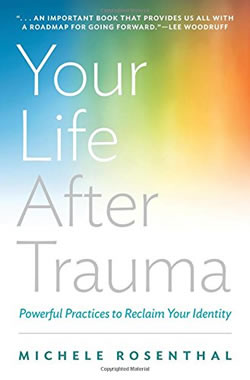Your Life After Trauma: Powerful Practices to Reclaim Your Identity is designed to help in “post-trauma identity development.” Eclectic in its methods, it uses motivational interviewing and incorporates cognitive behavioral, existential, gestalt, narrative, psychodynamic, psycho-educational, transpersonal, and neuropsychological frameworks into its exercises, questions, and passages.
In wording that is easy to digest, this book offers assistance to helping professionals in communicating otherwise complicated concepts related to the psychodynamic processes of trauma and recovery in a manner that is informative and helpful to clients. This book would be especially useful to therapists whose clients are willing to work to overcome their PTSD, but prefer to be more self-directed. Therapists can extract individual exercises to assist in servicing their clients, or even create their own exercises from ideas/concepts found in the book.
Rosenthal utilizes a person-centered approach that takes into account the stage at which the reader/user is in the healing process. She makes express provision for returning to specific exercises or concepts when one is ready, in case something does not feel right or comfortable at the time. She also provides a differentiated, tiered, or modified version of certain exercises as needed and appreciates the “small” and even “tiny” changes that help move recovery along and affirm successive approximation in the process of its readers.
Your Life After Trauma reads like a self-help book as opposed to a purely informational text. This in and of itself may be empowering to a reader in the process of healing. The conversational nature of her writing, especially in the case of open-ended questions that she asks readers, is akin to having a therapy session in which the therapist is writing responses instead of speaking audibly. The fact that she leads with her personal story of life-threatening trauma and continually makes references to her own challenges, goals, and triumphs in her healing process, and exposes the “universal identity crisis at the center of the PTSD experience and recovery process,” helps to create a feeling of support and community to the perhaps isolated traumatized reader. Providing a sense or normalization, yet creating a clear picture that recovery is possible helps to give the reader a sense of safety in numbers and belief that they can not merely recover, but thrive.
 Rosenthal, Michele (2015). Your Life After Trauma: Powerful Practices to Reclaim Your Identity. New York, NY: W. W. Norton & Company Inc. ISBN: 978-0-393-70900-1. Hardcover. 283 pages. Includes index, references, and other resources.
Rosenthal, Michele (2015). Your Life After Trauma: Powerful Practices to Reclaim Your Identity. New York, NY: W. W. Norton & Company Inc. ISBN: 978-0-393-70900-1. Hardcover. 283 pages. Includes index, references, and other resources.






